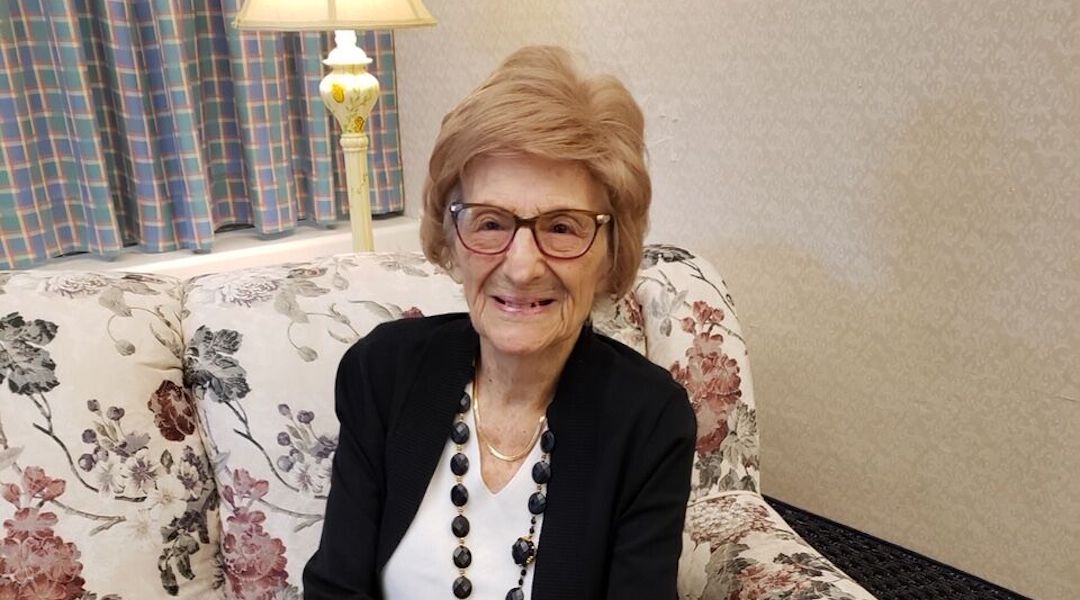Violet Spevack, weekly chronicler of Cleveland Jewry for 50 years, dies at 107
Her society column for the Cleveland Jewish News, launched on March 5, 1965, made her one of the of the longest continuously published columnists in the country

Violet Spevack’s popular society column ran in the pages of the Cleveland Jewish News for nearly 50 years. (Courtesy Cleveland Jewish News)
(Cleveland Jewish News via JTA) — Violet Spevack, whose popular society column ran in the pages of the Cleveland Jewish News for nearly 50 years, died Sept. 7. She was 107.
Spevack, who started writing “Cavalcade” on March 5, 1965 — six months after the creation of the weekly Cleveland newspaper — wrote more than 2,500 columns and hundreds more feature stories on her manual typewriter until her retirement in January 2015. She was one of the longest continuously published columnists in the country.
Spevack’s weekly descriptions of events in Greater Cleveland brought her fame and recognition her own right. Among the celebrities included in her column over the years were Don Rickles, George Burns, Milton Berle, Monty Hall, Buddy Hackett, Joan Rivers and Henny Youngman.
Spevack was inducted into the Cleveland Press Club Journalism Hall of Fame in November 2014.
The CJN also honored her at an event in 2011 called “Vi-Vi-Vi-vacious! A Cavalcade of Memories in Celebration of Violet Spevack’s 95th Birthday.” Gossip columnist Rona Barrett was the guest speaker, with 730 people attending.
“Violet, you put all of us to shame,” Barrett said. “If I ever reach 95, I hope to look as great and feel as good as you do tonight.”
Spevack also was recognized at an ice cream social in commemoration of her retirement in May 2015 at Temple Emanu El in Orange Village, Ohio, where she and her husband were founding members.
“I’ve had the time of my life covering our Jewish community through the lens of my society column, first called Cleveland Cavalcade and then just Cavalcade. I’ve had the great fortune of chronicling events throughout the Jewish community over six decades, rubbing elbows with local dignitaries as well as national celebrities who came to town,” she wrote in her farewell column.
The CJN has an editorial internship named for her — the Violet Spevack Editorial Intern.
Spevack began her career writing “Green’s Pasture,” a column for Temple Emanu El, and also wrote for her high school newspaper, The Glenville Torch, at Glenville High School in Cleveland. The CJN’s first editor, Arthur Weyne, launched her professional career.
“He hired me on the spot,” Spevack said in 2015. “I think I got $6 per column, maybe $5. I worked for every editor the paper has had — Arthur Weyne, Jerry Barach, the incomparable Cindy Dettelbach, Michael Bennett, and now Bob Jacob.”
Spevack and her husband, Dave, who died in 2013 at 101, were married for 72 years. He and Evel Barcus, a longtime friend who died in September 2016 at 99, accompanied Spevack to many events.
Those in the CJN newsroom remember the days when Spevack used to bring her typewritten columns into the office, and then in later years, she had someone send her columns via email.
Spevack, whose maiden name was Goldhammer, was born in Denver. Her paternal grandparents came from Austria-Hungary in the 1860s to look for gold.
Spevack grew up in the Glenville area of Cleveland in the 1930s, which was then considered a middle-class Jewish neighborhood. She learned Hebrew at The Jewish Center, now Cory United Methodist Church.
Although she came from what she called “the Wild West,” she was passionate about Cleveland.
“I remember the versatility of this community and all of the different wonderful people who have been in the arts, in books and religion, and active in the community,” she told the Cleveland Plain Dealer in a video in 2015. “I have been very energized by a community that has, I think, been one of the best communities in the country.”
This article originally appeared on JTA.org.




















